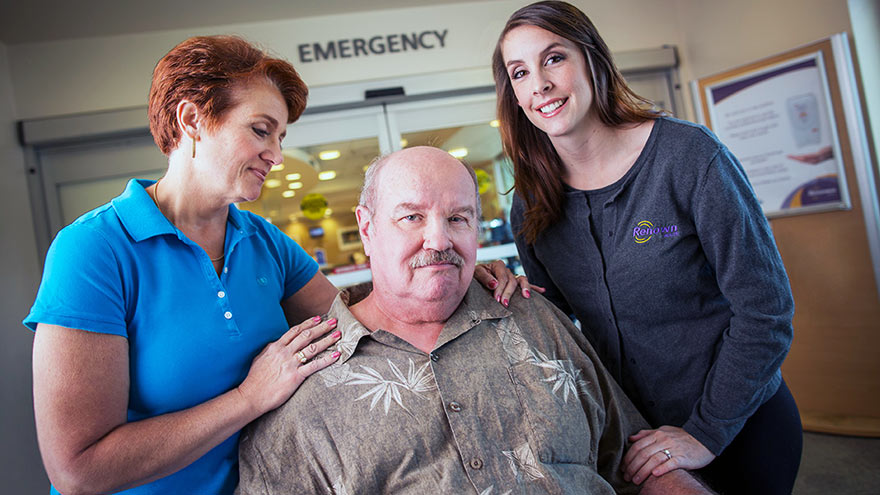Buscar
Results for 'imaging'
Clear-
When to Seek Care for Abdominal Pain
Abdominal pain is one of the most common complaints that brings individuals to the emergency room. We spoke with emergency physician Bret Frey, MD, to ask about when and where to seek care for abdominal pain. Dr. Frey advises that any time you feel something is developing inside your body that is substantially different from what is normal for you, understand that something is wrong. He further explains that warning signs of an acute medical situation include fever, vomiting or a rapid change in function and ability to move due to pain. These symptoms indicate that one needs to be evaluated by a medical professional. This evaluation will include the care team conducting an examination and asking a series of questions to determine if additional diagnostics, such as lab work or imaging, are needed. Be prepared to discuss where the pain is and what it feels like, in addition to how long it’s been bothering you and if it’s constant or intermittent. While appendicitis often comes to mind when thinking about abdominal pain, Dr. Frey says that this is not the bulk of cases that the Emergency Department sees. In fact, often the pain does not have a specific diagnosis, but our team of board-certified emergency physicians are experienced in assessing and caring for those experiencing the acute symptoms he described. “We often don’t come away with an answer about exactly what it is, but we substantially rule out life threats in a very methodical and systematic way,” said Frey. The abdomen includes many organs, including the stomach, liver, small and large intestines, gallbladder and pancreas. In addition, pain stemming from your chest, pelvis or back may be felt in the abdominal area. If you are experiencing abdominal issues that are persistent but not an emergency, talk to your primary care doctor about what you are experiencing, and be prepared to review the history of this pain, medications, allergies and diet. He or she will be a good partner to review conditions such as gas, heartburn, constipation, diarrhea, inflammation or menstrual and ovulation pain. Drinking plenty of water is always an important part of supporting your health.
-
Concussion Risks and Prevention
It’s important to be aware of the risk of a concussion, which can have serious health implications. Susan Park, MD, discusses the effects of concussions and how they can be prevented. According to Susan Park, MD, a Renown Medical Group doctor who specializes in sports and family medicine, concussions are a serious issue — especially among children whose developing brains “are more susceptible to brain injury and long-term effects from concussions.” All parents, coaches and athletes, she points out, should be aware of the risks of concussions and take precautions to avoid them. What is a concussion and how does it occur? Dr. Park describes a concussion as a traumatic brain injury resulting from direct or indirect impact to the head or body, during which the brain shakes back and forth in the skull. This may cause some bruising of the brain. In severe cases, traumatic head injuries can cause bleeding, which if not treated quickly, can be fatal. What are the health implications of a concussion? Symptoms of drowsiness and confusion can be a sign of a concussion after a head injury. Some short-term effects may include headaches, dizziness and difficulty concentrating. Long-term concerns can further include mood disorders, sleep disturbance and problems with cognitive function-concentration, which may affect school performance. What sports carry the highest risk of suffering a concussion? Dr. Park notes participation in any impact sport can result in a head injury. But among school-age kids, she treats more concussions from football and soccer than any other sport. However, during the winter months, skiing and snowboarding injuries can be a common cause of concussions Any blow to your head, neck or upper body can result in a concussion with symptoms including, but not limited to, feeling dazed or confused, dizziness, nausea/vomiting or a headache. Initial treatment of concussions varies depending on severity. Rest, avoiding vigorous activity and a reduced school workload help young athletes recover after a concussion. Dr. Park notes that sometimes further imaging and an ER visit will be required. Otherwise, rest from activities is the main treatment, along with not returning to sports activities until further clearance from a healthcare provider.
-
Three Emergency Room Options for You and Your Family
Renown Health has three emergency rooms open 24 hours a day, seven days a week, ready to serve our community. We checked in with Amy Hawkins, Manager of Clinical Nursing at Renown South Meadows, to learn more about the emergency room experience and how each can accommodate your emergency care needs. 1. Renown Regional Emergency Room The emergency room at Renown Regional Medical Center is the only Level II Trauma Center between Sacramento and Salt Lake City, treating more than 80,000 ER and trauma patients annually. Services Offered: This location offers immediate emergency care covered by general surgeons and coverage by the specialties of orthopedic surgery, neurosurgery, anesthesiology, emergency medicine, radiology and critical care. In addition, tertiary care needs include cardiac surgery, hemodialysis and microvascular surgery. (Patients may be referred to a Level I Trauma Center.) Renown Regional ER Location 2. Renown South Meadows Emergency Room South Reno is expanding, and so is Renown South Meadows ER! Exciting transformations are happening across this campus, including the new 121,000-square-foot specialty care center and upgrades to the existing medical center—expanding care to our patients. Added benefits to the more intimate setting at South Meadows: Smaller ER also means more personal experience. The team traditionally has more time to spend with each patient at the bedside. A smaller campus means convenient parking, as the ER is just outside the front entrance; however, patients are reminded to follow marked road signs when approaching the campus during construction. Most patients arrive by private vehicle versus an ambulance, so we are very accustomed to thinking quickly on our feet. Benefits to new construction: A new Cath lab will allow us to treat patients experiencing a heart attack and needing immediate intervention to open vessels in their hearts. Additional lab and imaging capabilities for our patients Services Offered: This location offers immediate emergency care staffed with board-certified emergency physicians. Patients can expect one-on-one interactions with trusted providers and shorter wait times. All emergency room services are open during construction, and patients are reminded to follow marked road signs when approaching the campus. South Meadows ER Location 3. Renown Children's Hospital Emergency Room This location offers immediate emergency care, with pediatric specialists always on staff. In addition, the Children's ER lobby is ideal for our littlest patients, with a child-friendly atmosphere and vibrant colors to help decrease the anxiety accompanying emergencies. Medical equipment is sized just for kids, and we offer a distraction machine, games and movies to help children cope with what can be a traumatic experience, like getting an IV. In addition, we have Child Life Specialists available to provide emotional support to both children and their families. When to Bring Your Child to the ER: Allergic reactions Asthma attacks Baby under three months old with a temperature higher than 100.4 degrees Fahrenheit Broken bones Burns Choking or poisoning Difficulty breathing Eye injuries Fainting, dizziness and confusion Head injuries Heart attack Rashes Seizures Severe bleeding Severe headache Severe pain Skin infections Stitches Stroke Venomous stings and bites Renown Children's Hospital Location
Read More About Three Emergency Room Options for You and Your Family


